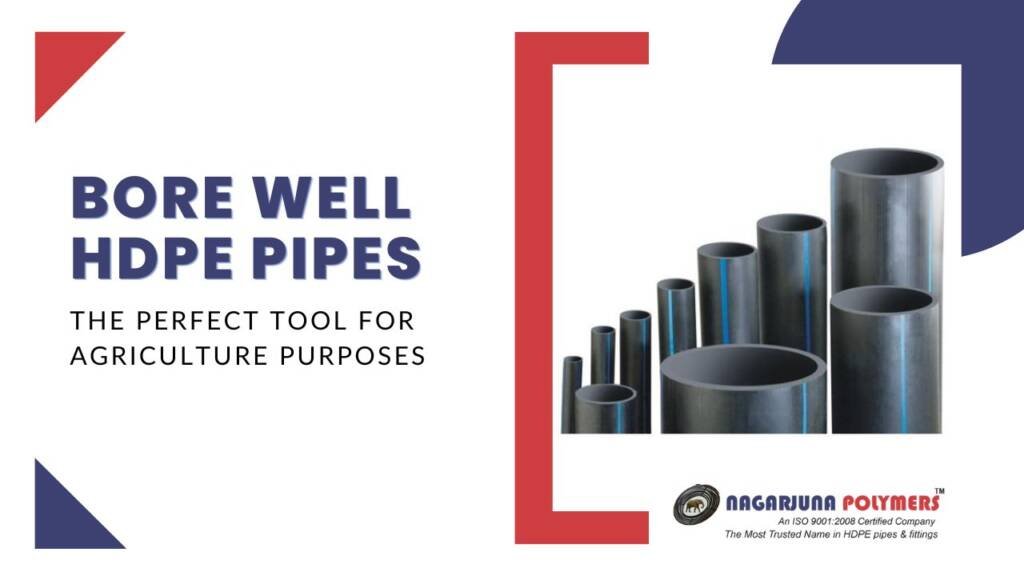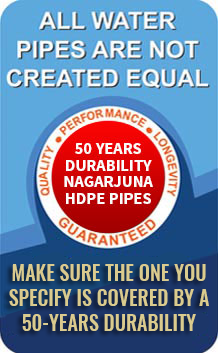The popularity of high density-polythene pipe, often known as Bore Well HDPE pipe, can be attributed to the material’s strong demand in municipal, industrial, and agricultural water applications.
It is currently the most used kind of plastic. Different density levels of HDPE pipes are available, starting with low density, cross-linked, low molecular weight, high molecular weight, medium-density, and ultra-high medium-density.
Affordable & Long Lasting
Like many other plastic pipe options, HDPE is reasonably priced. Fewer connections are needed between components because they come in longer sticks or coils, and since thermal fusion is utilized to link them, time-consuming couplers do not need to be fitted.
Tough & Lightweight
In contrast to PVC, which can become brittle with time, HDPE borewell pipes maintain their flexibility and strength while being light and manageable.
It can be employed in various applications and holds up well in challenging soil conditions when other rigid pipe systems fall well short.
It Doesn’t Have Corrosion & Chemical Issues.
Imagine not worrying about your water utility coping with a Flint water crisis. Since HDPE is made of plastic, it is unaffected by all but the most complicated chemicals and pH fluctuations.
It guarantees that the pipes you install won’t rust, leak, or pick up impurities from the parts. Mostly, HDPE will handle situations where metal pipes would struggle badly.
Impact & Fatigue Resistant
Contrary to other kinds of plastic pipe, such as PVC, HDPE is still flexible and resistant to shocks even when it becomes cold outside.
You can rely on it to hold up well for many years to come without worrying about anything near the water line. It is a fantastic option for regions where soil movement may be an issue because it is also more resistant to motion fatigue.
Leak Proof
Being able to thermally fuse two lengths of the line without using couplers, glue, or other similar materials makes HDPE a unique material for borewells and other agriculture applications.
Flexible Option
Trenches can be challenging to install pipes in because they often seem like they were dug hurriedly over lunch. HDPE can handle these circumstances better than other pipe forms since it keeps its elasticity.
Do you need to use horizontal directional drilling because of a challenging situation? HDPE Borwell pipes are capable of doing that and looking for an effective solution for a broken line?
That is also something it is capable of. In reality, it can be assembled quickly and efficiently and function effectively with floating, submerged, or plow and plant installations.
Sustainable & Ecological
In contrast to other pipes, HDPE pipes are biodegradable and straightforward to recycle. Nowadays, HDPE pipes are constructed from recycled and pre-consumer materials.
Compared to other pipes, HDPE pipes take the least amount of energy to manufacture. HDPE plastic is environmentally beneficial since it uses a small fraction of the energy needed to fake it.
Due to its non-toxic and inert characteristics, HDPE is safe for transporting portable water. HDPE pipes are recognized as the most environmentally friendly plastic since they don’t produce or emit toxic fumes into the environment.
Since HDPE is a flexible material that meets the standards of all agriculture requirements in the country, it is in great demand.
The choice of pipes for household, industrial, and agricultural water needs has become a critical selection that might have long-term effects on any project or agricultural area. To reap the full benefits of HDPE pipes, choose those made by a reputable brand. At Nagarjuna, we offer quality Bore well HDPE pipes built to last and help you in all your agricultural projects.




